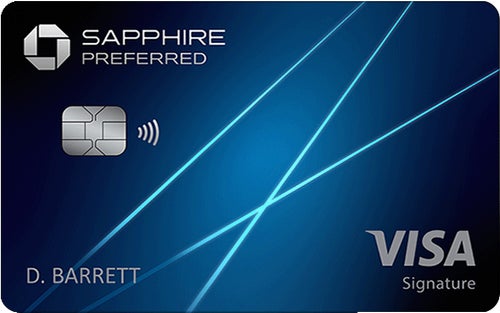KEY LINKS:
- Chase Sapphire Preferred® Card – Earn 100,000 bonus points after $5,000 in purchases in your first 3 months from account opening. $95 annual fee.
- Chase Sapphire Reserve® – Earn 60,000 bonus points after you spend $4,000 on purchases in the first 3 months from account opening. $550 annual fee
There are two Chase personal credit cards that are considered premium Ultimate Rewards earning cards. The Chase Sapphire Preferred and the Chase Sapphire Reserve card are the two cards. I thought it might be a good idea to do a comparison of the Chase Sapphire Reserve vs Chase Sapphire Preferred card, so if you’re looking to get one of these 2 cards, this comparison of the Chase Sapphire Reserve and Chase Sapphire Preferred card might help

Chase Sapphire Reserve® vs. Chase Sapphire Preferred® Card: Welcome Offer
The signup bonuses for the Chase Sapphire Preferred and Chase Sapphire Reserve cards vary over time.
Currently, the welcome offer on the Chase Sapphire Preferred card allows you to earn 100,000 bonus points after you spend $5,000 on purchases in the first 3 months from account opening
On the other hand, the welcome offer on the Chase Sapphire Reserve card allows you to earn 60,000 bonus points after you spend $4,000 on purchases in the first 3 months from account opening.
So currently the two welcome offers are the same, which makes this a tossup in my opinion.
ADVANTAGE: Sapphire Preferred (though that may change over time depending on the current bonuses above)
Chase Sapphire Preferred® Card vs Chase Sapphire Reserve®: Ultimate Rewards redemptions
The Chase Sapphire Preferred card gives you 1.25 cents per point when redeeming through Chase Travel℠.
The Chase Sapphire Reserve card gives you a value of 1.5 cents per point
(SEE ALSO: Why it pays to check the Chase Ultimate Rewards mall before transferring points)
Both the Chase Sapphire Reserve and Chase Sapphire Preferred card have the advantage over just having a Chase Freedom Unlimited® or Chase Freedom Flex® card, which only give a value of 1 cent per point, whether it’s on travel purchases through Chase Travel℠ or just as statement credits.
ADVANTAGE: Chase Sapphire Reserve card
Chase Sapphire Reserve® vs Chase Sapphire Preferred® Card: Transfer partners
Although the Chase Sapphire Reserve has an advantage over the Chase Sapphire Preferred card when redeeming through the Ultimate Rewards mall, the real value of both cards is their ability to transfer Ultimate Rewards to partners, such as United Airlines, Southwest Airlines, Hyatt Hotels and more.
ADVANTAGE: Even (both cards have the same transfer partners)
Chase Sapphire Preferred® Card vs Chase Sapphire Reserve®: Category spending bonuses
Comparing the Chase Sapphire Preferred vs Reserve in terms of their category spending bonuses, they share some of the same category bonuses.
For the Sapphire Preferred:
- 5 points per $1 spent on all travel purchased through Chase Travel℠
- 3 points per $1 spent on dining (including eligible delivery services and takeout).
- 3 points per $1 spent on select streaming services.
- 3 points per $1 spent on online grocery purchases (not including Target, Walmart and wholesale clubs).
- 2 points per $1 spent on travel not purchased through Chase Travel℠
- 1 point per $1 spent on other purchases.
The Sapphire Reserve offers:
- 10 points per $1 spent on Chase Dining purchased through Chase Travel℠
- 10 points per $1 spent on hotel stays and car rentals purchased through Chase Travel℠
- 5 points per $1 spent on air travel purchased through Chase Travel℠
- 3 points per $1 spent on travel and dining not booked with Chase.
- 1 point per $1 spent on other purchases.
WEAK ADVANTAGE: Chase Sapphire Reserve credit card
Chase Sapphire Reserve® vs Chase Sapphire Preferred® Card: Other benefits
The Chase Sapphire Preferred card offers primary rental car insurance, no foreign transaction fees, trip cancellation insurance, trip delay reimbursement and baggage delay coverage
The Chase Sapphire Reserve has all of the above PLUS
- $300 annual travel credit, applied automatically to anything in the travel category
- $100 reimbursement for Global Entry
- Priority Pass airport lounge access
BIG ADVANTAGE: Chase Sapphire Reserve
Chase Sapphire Reserve® vs Chase Sapphire Preferred® Card: Annual Fee
I saved the big one for last, of course. With all those additional benefits, the Chase Sapphire Reserve also comes with a hefty $550 annual fee, and an additional fee for additional authorized users (who don’t end up with many of the benefits). In contrast, the Chase Sapphire Preferred has a $95 annual fee. No additional fee for authorized users.
Yes, some of the extra fee can be covered by the $300 annual travel credit (above under other benefits), but $300 in travel credits is NOT the same as $300 in cash.
HUGE advantage to the Chase Sapphire Preferred card
The Bottom Line: Comparing the Chase Sapphire Reserve® and Chase Sapphire Preferred® Card
KEY LINKS:
- Chase Sapphire Preferred® Card – Earn 100,000 bonus points after $5,000 in purchases in your first 3 months from account opening. $95 annual fee
- Chase Sapphire Reserve® – Earn 60,000 bonus points after you spend $4,000 on purchases in the first 3 months from account opening. $550 annual fee
Deciding whether to get the Chase Sapphire Preferred or Chase Sapphire Reserve card comes down to what you’re looking for in a card. I always recommend that you first figure out WHAT TO DO with your miles and points BEFORE applying for a card.
To me, if you were just starting out, or relatively new to miles and points, I would recommend the Chase Sapphire Preferred card
(SEE ALSO: Why I keep recommending the Chase Sapphire Preferred for people starting out)
If you’re more experienced, and feel confident in the system you have in place that the $550 annual fee will not be wasted, then the Chase Sapphire Reserve card becomes more attractive. Certainly, other than the annual fee, there’s no arguing with the benefits of the Chase Sapphire Reserve benefits.
What is your take? Chase Sapphire Preferred or Chase Sapphire Reserve? Leave your vote in the comments below
This site is part of an affiliate sales network and receives compensation for sending traffic to partner sites, such as thepointsguy.com. This may impact how and where links appear on this site. Responses are not provided or commissioned by the bank advertiser. Some or all of the card offers that appear on the website are from advertisers and that compensation may impact on how and where card products appear on the site. Any opinions expressed in this post are my own, and have not been reviewed, approved, or endorsed by my advertising partners and I do not include all card companies, or all available card offers. Terms apply to American Express benefits and offers and other offers and benefits listed on this page. Enrollment may be required for select American Express benefits and offers. Visit americanexpress.com to learn more. Other links on this page may also pay me a commission - as always, thanks for your support if you use them







 Dan Miller travels with his wife and 6 (SIX!) children. He loves to help families travel for free / cheap, especially larger families. If you are looking for help, drop him an email at
Dan Miller travels with his wife and 6 (SIX!) children. He loves to help families travel for free / cheap, especially larger families. If you are looking for help, drop him an email at 
So I have the sapphire preferred and have 70k points. If I get the reserve and cancel my regular sapphire…I keep those original 70k pts, correct?
Yes but you’ll need to have the Chase Sapphire Reserve open first and TRANSFER your points from the Chase Sapphire Preferred to your new Chase Sapphire Reserve card. SEE: Transferring Chase Ultimate Rewards between accounts before closing an account
The Chase Sapphire Reserve offers trip insurance, which could be a significant savings especially for cruises/all inclusive resorts. It also includes rental car insurance, which I know a lot of other credit cards have eliminated as well as other protection buying insurance. Taking a cruise so justified the cost because it was cheaper than trip insurance for four people and then we’ll see whether it makes sense to maintain or drop down to preferred in other years.
If I have a sapphire preferred card, can I upgrade to reserve and get the 100k?
You can upgrade but you won’t get the 100k bonus. That’s only for new signups
. . . but (if I understand correctly) I open the Reserve card first; hit the spend limit to get the 100,000-point sign up bonus; then — after making sure to transfer the Preferred points into the Reserve account — close the Preferred account, I should keep/maximize everything . . . right?
That would be my understanding yes.
It’s interesting, but the more I look at this, the less attractive the Chase Sapphire Reserve card is. Not only are most of the benefits already associated with the Chase Sapphire Preferred, but . . .
1) If the Ultimate Rewards points are associated per card, and not per cardholder, it sounds like I would have two small(er) “piles of points” rather than one large one, making it more difficult to use them when a larger number is needed.
2) From your list above, the two most attractive features (for my usage) seem to be: a) 3x points with the CSR on travel and dining, versus 2x with the CSP; and b) the $300 travel credit. (Global Entry is a wash as I get that benefit with other cards in my wallet.)
3) The biggest downsides are, again for the way I use/travel, seems to be: a) adding authorized users increases the overall annual fee with the CSR, while the $95 fee for the CSP remains $95; b) there is no ongoing $100 travel discount as Chase offers with their other Visa Infinite card, co-branded with Ritz-Carlton; and c) the Priority Pass membership is only for the primary account holder, rather than a Priority Pass Select membership which allows the account holder to bring in guests (a benefit I already receive with the Citi Prestige card).
NOTE: according to the Priority Pass website, membership at their “Prestige” level (unlimited member visits, but all guests must pay $27 per visit) costs $399/year if you buy it directly from Priority Pass. This is the level of benefit one gets with the Chase Sapphire Reserve card, and the AMEX Platinum card. Only the Citi Prestige card, as far as I know, offers the “Select” level membership as a benefit where you AND your guest(s) get in free, and is a level you cannot buy from Priority Pass directly.
Keeping the CSP and Citi Prestige cards and skipping the Chase Sapphire Reserve card is getting more and more attractive!
Up to you of course! A few things though – you can transfer points between cards (And authorized users) for free at any time. I always transfer the points from my and my wife’s Freedom cards to my Ink card.
As for the biggest most attractive feature I’d say it’s the 100K UR signup bonus!
I agree that the 100k is very attractive . . . but the question is whether it’s worth keeping long-term, or whether it’s better to keep the CSP and Citi Prestige. Despite Citi’s crappy customer service, the Priority Pass Select is better, and you still get that 4th night free . . . ;^)
A guide to Chase Sapphire Reserve benefits is now available on Chase’s website —
https://www.chase.com/card-benefits/sapphirereserve/travel
— and the Priority Pass benefit IS at the SELECT level, same as the Citi Prestige card.
There are additional benefits not yet mentioned though hotels . . . it’s looking more attractive again.
If you have CSP and decide to get CSR, transferring the points from CSP will make them worth the same 1.5 cents / point. With both signup bonuses, you could get 150,000 points valued at $2250.
Dan, if I open the 100k bonus preferred card then after spending 5k I get the 100k miles and then I transfer to an airline program and then cancel the preferred card, will I still have to pay the $95 since its waived for the first year?
I know it’s somewhat apples-and-oranges, but how would the Amex gold card compare with these two?
To me, the Gold card fits somewhere in between these two cards (with a $250 annual fee). You can bring the net cost of the fee down if you take advantage of the monthly credits that come with the Gold card, but that also promotes breakage. I like the Sapphire Preferred over the Gold card personally, but a lot of it depends on your own preferences, like if you value Chase Ultimate Rewards over American Express Membership Rewards points
Thanks for sharing this blog, Keep it up!